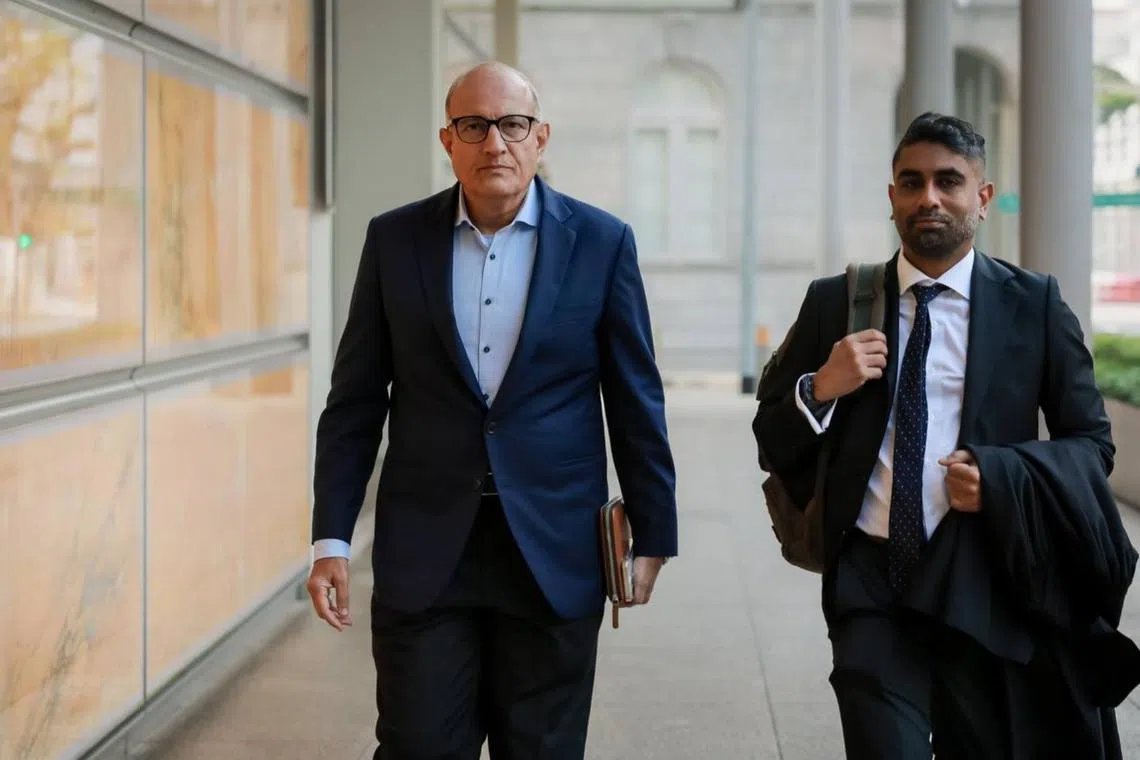Court of Appeal dismisses Iswaran’s third bid to obtain statements of trial witnesses
Sign up now: Get ST's newsletters delivered to your inbox

Former transport minister S. Iswaran arriving at the court on Sept 3.
ST PHOTO: GAVIN FOO
SINGAPORE - With his trial due to begin in a week’s time, former transport minister S. Iswaran on Sept 3 failed in his third attempt to obtain conditioned statements of every prosecution witness.
The Court of Appeal dismissed his latest bid after hearing arguments from his lawyer, Senior Counsel Davinder Singh, and without requiring the prosecution to respond.
A conditioned statement is a mode of giving evidence in a written statement, in lieu of oral testimony.
Iswaran, 62, had sought a criminal reference – an application asking Singapore’s top court to answer a question of law of public interest.
Under the law, an accused person who wants to file a criminal reference would first need to apply to the Court of Appeal for permission to do so.
It is for the court to decide whether the question is of sufficient public interest to be worth answering.
Mr Singh said his client’s application focused on two questions – whether witness statements should be included as part of the prosecution’s disclosure obligations, and whether the court has the power to order the prosecution to do so.
The court, comprising Chief Justice Sundaresh Menon and justices Woo Bih Li and Steven Chong, said the two questions raised were not questions of law of public interest.
Chief Justice Menon said the first question was tied to the prosecution’s disclosure obligations under the Criminal Procedure Code (CPC).
The meaning and scope of that particular provision are clear, he said.
Under the CPC, the prosecution must disclose witness statements that are intended by the prosecution to be admitted at the trial.
As for the second question, the Chief Justice said Mr Singh’s contention was that Parliament had overlooked broadening the scope of disclosure in 2018, when major changes were made to the CPC.
Chief Justice Menon rejected the senior counsel’s argument that the court should give its own meaning to the provision.
He added that the court did not have the power or the inherent jurisdiction to effectively invalidate a provision that has been effected by an act of Parliament.
Iswaran faces a total of 35 charges,
Another 32 counts are for obtaining items worth more than $237,000 as a public servant, while one is for obstructing the course of justice.
The charges relate to his dealings with hotel and property tycoon Ong Beng Seng, Lum Chang Holdings’ managing director David Lum.
The defence’s first attempt for a court order that the prosecution should provide conditioned statements was dismissed on June 11 by an assistant registrar.
Iswaran’s legal team had contended that the prosecution is required to provide conditioned statements for every witness that it intends to call at the trial.
The prosecution argued that the law requires it to provide only the conditioned statements that it intends to admit at the trial.
It said it does not intend to admit any conditioned statements at Iswaran’s trial. No such statements have been recorded, and thus none was provided to the defence.
The defence then filed an application, known as a criminal revision, for a High Court judge to review the assistant registrar’s decision.
On July 19, Justice Vincent Hoong dismissed this second attempt.
The judge said the words of the provision under the CPC are “clear and unambiguous”.
He added that the prosecution needed to disclose only the statements of witnesses that it intends to admit at the trial, and not of every witness it intends to call.
On Sept 3, Mr Singh made the point that the prosecution has to disclose the entirety of its evidence because it can change its mind on whether it intends to admit the statements.
He recalled that in April, the prosecution had asked if the defence would consent to conditioned statements being filed.
He said that when the defence team asked to see the statements before consenting, the prosecution changed its position and said it would not be filing conditioned statements.
“Intention is a moving target,” said Mr Singh.
Chief Justice Menon replied: “The language of the statute is not a moving target.”



